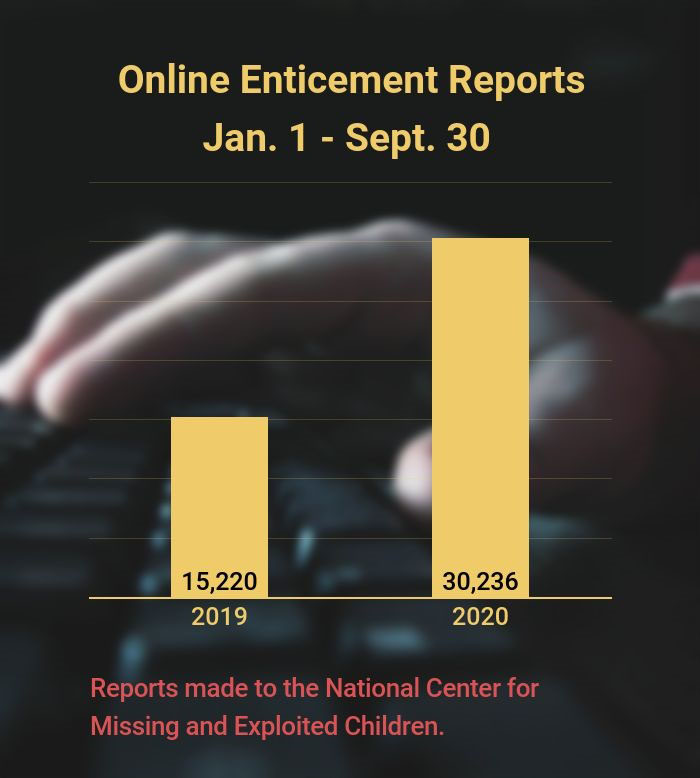How to help kids stay safe from online sexual predators
Dec. 10, 2020
The pandemic has brought many unexpected things, and among them is an increase in opportunities for online sexual predators. Think about it: with schools doing partial or complete distance learning, kids are spending more time online than ever before. And with parents working inside or outside the home, some of that online activity is unsupervised. This is exactly the sort of situation a sexual predator is looking for.
 The numbers tell the story: nationally, reports of predators targeting children online have doubled over the nine-month period from Jan. 1 to Sept. 30. In 2019, there were 15,220 reported incidents during that time. This year, there were 30,236. And the National Center for Missing and Exploited Children (NCMEC) reports that in the first quarter of 2020, predators were openly discussing the opportunities presented by the pandemic; namely, luring unsupervised children into making and sending sexually explicit material.
The numbers tell the story: nationally, reports of predators targeting children online have doubled over the nine-month period from Jan. 1 to Sept. 30. In 2019, there were 15,220 reported incidents during that time. This year, there were 30,236. And the National Center for Missing and Exploited Children (NCMEC) reports that in the first quarter of 2020, predators were openly discussing the opportunities presented by the pandemic; namely, luring unsupervised children into making and sending sexually explicit material.
Lest you think that sort of thing doesn’t happen here, Minnesota is seeing the same trend. Based on tips the Bureau of Criminal Apprehension (BCA) has received, enticement in our state has nearly doubled over the same period last year.
Remember that sexual exploitation doesn’t usually happen all at once. Sexual predators often use grooming tactics, which they can practice just as easily online as they can in person. For example, what starts out as an adult frequently “liking” your child’s images or posts online may turn into engaging in sexual conversation or role playing, or asking for sexually explicit images. Sometimes they even pretend to be closer to your child’s age or even a different gender to earn the child’s trust – and they may have to hide their identity because your child may already know them. Most children are abused by people they already know.
And it’s not just younger children that are in danger of sexual exploitation. The pandemic is causing teen sexting to become more prevalent. Because they’re away from each other so much that even dating has gone virtual, the temptation to send explicit photos and texts is even greater.
The key to protecting your children from sexual exploitation, no matter how old they are, is communication. It’s an uncomfortable subject, but it’s better than the alternative. Tell your kids to report any suspicious contacts to you or another trusted adult. And remind older kids that once an image is sent, they can no longer control where it goes or who sees it, and it may never go away.
You can learn more about online sexual exploitation on NCMEC’s website, and Psychology Today has tips for discussing sexting with your teens. The pandemic may bring dangers besides contracting COVID-19, but there are things you can do to protect your children.

